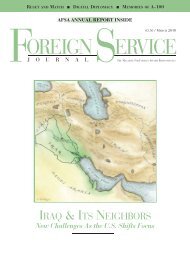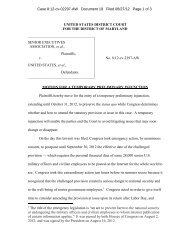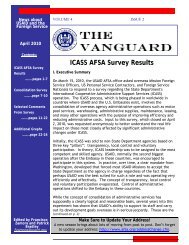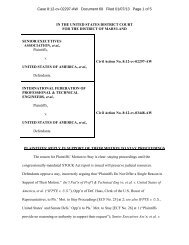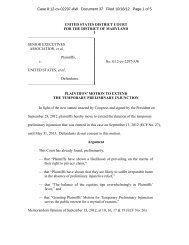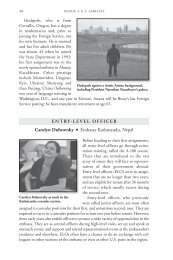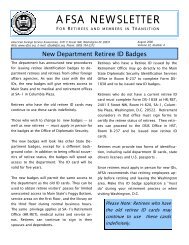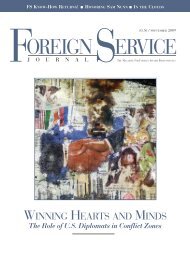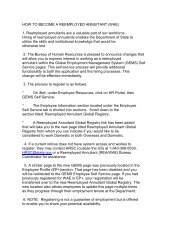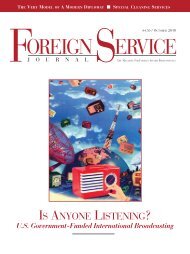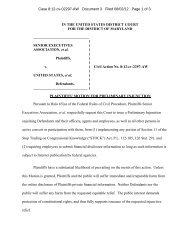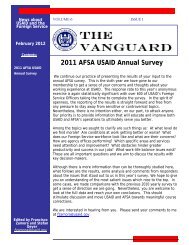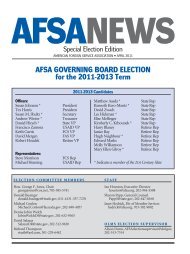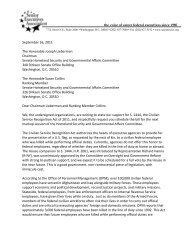F OCUS - American Foreign Service Association
F OCUS - American Foreign Service Association
F OCUS - American Foreign Service Association
You also want an ePaper? Increase the reach of your titles
YUMPU automatically turns print PDFs into web optimized ePapers that Google loves.
udget of $3.5 million, and a professional<br />
budget process.<br />
AFSA is now the equivalent of a<br />
mid-size company. And that requires<br />
us to be serious about managing our<br />
finances so that we don’t do silly<br />
things with our members’ dues and<br />
contributions. Our Finances and<br />
Audit Committee has a mix of members<br />
with private sector and NGO<br />
experience who know what they’re<br />
talking about. The committee is<br />
independent, making decisions about<br />
investments and expenditures on<br />
their merits, without being influenced<br />
by the fads of the moment or<br />
the enthusiasms of AFSA officers. As<br />
a result, our financial portfolio has<br />
taken off and we’re in good shape.<br />
FSJ: The third element you identified<br />
as key to success is institutional<br />
strength. What do you mean by that?<br />
TDB: The first element of institutional<br />
strength is unity. AFSA and 10<br />
other organizations are all together in<br />
the <strong>Foreign</strong> Affairs Council. Second is<br />
money: You can’t do anything without<br />
money and committed people, and we<br />
have both. And third, which has been<br />
very important, of course, was AFSA’s<br />
becoming the legally recognized<br />
exclusive employee representative for<br />
<strong>Foreign</strong> <strong>Service</strong> personnel. That was<br />
the basis for everything.<br />
FSJ: That’s a good segue for us to<br />
talk a bit more about the “Young<br />
Turks” movement you helped lead.<br />
Our June 2003 issue celebrating the<br />
30th anniversary of AFSA’s becoming<br />
a union, to which you contributed an<br />
article, gives a lot of the historical<br />
details. But to set the stage, would it<br />
be fair to say that AFSA was more a<br />
social club than an advocacy group at<br />
that time?<br />
TDB: Yes, but the real problem<br />
was that the same people who had the<br />
senior positions in the State Department<br />
— the under secretary for political<br />
affairs, the director general, many<br />
16 FOREIGN SERVICE JOURNAL/JULY-AUGUST 2008<br />
“Forming a union was<br />
the only way to gain<br />
some degree of control<br />
over our destiny and<br />
bring equity and<br />
transparency to the<br />
whole process.”<br />
of the assistant secretaries and so on<br />
— were also officers in AFSA. That<br />
struck many of us as a huge conflict of<br />
interest, when what we needed was<br />
an independent voice.<br />
Each of the Young Turks had<br />
something they wanted: Tex Harris<br />
wanted a grievance system; Charlie<br />
Bray wanted a linkage of resources to<br />
policy; and I wanted co-determination<br />
of personnel policies and procedures.<br />
We had these very discrete elements<br />
of change, but when you put them all<br />
together, they added up to more than<br />
the sum of the parts. And so the question<br />
was, how do you get that? You<br />
have to have a base, and the only base<br />
we saw was AFSA.<br />
When the time came to elect the<br />
new AFSA Governing Board, we realized<br />
that there are more mid-level<br />
and junior officers than seniors, so we<br />
could win an election. We put up a<br />
slate and we won (with some support<br />
from senior officers, I should add).<br />
That gave us an organizational base of<br />
people paying dues, and a magazine<br />
with which you’re familiar that<br />
allowed us to do outreach — a propaganda<br />
arm, if you will.<br />
That happened in the late 1960s.<br />
Then, very early in the 1970s,<br />
President Nixon signed the executive<br />
order bringing white-collar unions<br />
into the Civil <strong>Service</strong>. There was a big<br />
fight over what the structure of that<br />
would be, which we won. Then we<br />
got a showing of interest and we persuaded<br />
the <strong>Foreign</strong> <strong>Service</strong> itself that<br />
we had to unionize — even though<br />
that was a dirty word for a lot of people.<br />
But we made the argument that<br />
forming a union was the only way to<br />
gain some degree of control over our<br />
destiny, and bring equity and transparency<br />
to the whole process.<br />
We won the internal struggle for<br />
the soul of the <strong>Service</strong>, and then beat<br />
the <strong>American</strong> Federation of Government<br />
Employees in elections to<br />
become the exclusive employee representative<br />
for the people of the<br />
<strong>Foreign</strong> <strong>Service</strong> in 1973 — not just at<br />
State but at USAID and all the other<br />
foreign affairs agencies. And we<br />
developed huge momentum that is<br />
still growing.<br />
FSJ: Let’s talk about your <strong>Foreign</strong><br />
<strong>Service</strong> career now. You entered the<br />
<strong>Service</strong> in 1959, right after three years<br />
in the Air Force. What drew you to<br />
pursue a diplomatic career?<br />
TDB: I had an epiphany during<br />
my studies at the Woodrow Wilson<br />
School at Princeton. In that program,<br />
you participate in a policy conference<br />
every semester. In the spring policy<br />
conference of my junior year, in 1953,<br />
the subject was Puerto Rico and the<br />
focus was economic development.<br />
For the first time in its history,<br />
Princeton kicked in airline tickets for<br />
the conference participants to travel<br />
there and see for themselves how<br />
economic development was being<br />
achieved on that small island. My fellow<br />
travelers to Puerto Rico included<br />
Ralph Nader, by the way.<br />
Inspired by the brio of all that, I<br />
decided then and there that I wanted<br />
to be in the <strong>Foreign</strong> <strong>Service</strong>, and I<br />
switched from the domestic to the<br />
international side of the Wilson<br />
School. I went on to the international<br />
affairs graduate school at Fletcher,



